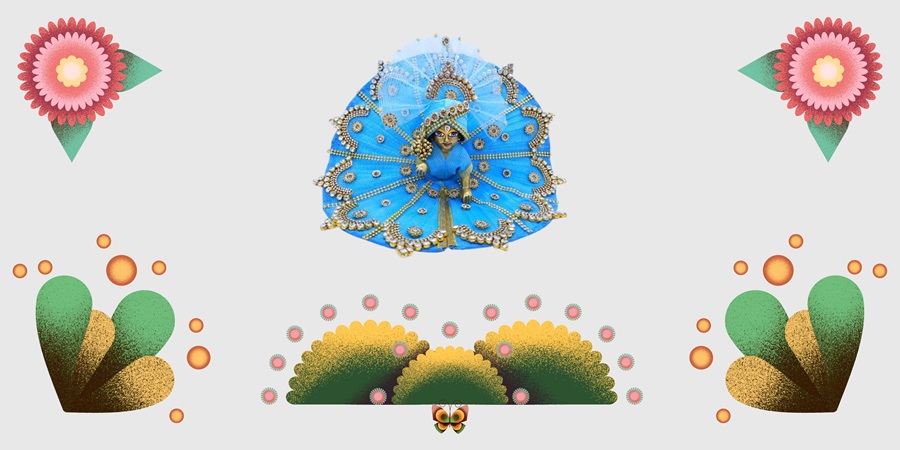Janmashtami is a very important festival in India. It is all about the birth of Lord Krishna, who is a special and loving god. People really love this festival and celebrate it with lots of joy.
On this day, Hindus all over India come together to celebrate the birth of Lord Krishna with prayers, songs, dances, and feasts and dress him in beautiful Laddu Gopal Dress. Temples and homes are decorated with flowers and lights, and special dishes are prepared to offer to Lord Krishna. Many devotees also keep a fast until midnight, when Lord Krishna is believed to have been born.
At midnight, temples and homes erupt in celebration, with devotees singing hymns, chanting mantras, and dancing with joy. Many people also dress up as Lord Krishna and his devotees and participate in re-enactments of his life stories.
Janmashtami is a time for Hindus to come together and celebrate the birth of their beloved Laddu Gopal. It is also a time for reflection and spiritual growth. Many cities and towns in India hold cultural events such as dance performances, plays, and music concerts. Dahi Handi, a popular
In this article, we will look at the importance of Janmashtami, learn about the stories connected to it, and find out when this special event is observed.
The Story Behind Janmashtami
The story of Janmashtami is incomplete without the legendary tales of Lord Krishna’s life. One of the most famous episodes is the divine birth of Krishna in Mathura. As per Hindu beliefs, Lord Krishna was born to Devaki and Vasudeva on a dark and stormy night in a prison cell. They were held captive by Devaki’s brother, Kansa, who was a wicked ruler.
Krishna’s birth came with miracles. The prison doors opened by themselves, and the guards fell asleep. Krishna’s father, Vasudeva, took the baby across the Yamuna River to Nanda and Yashoda’s house in Vrindavan. This secret journey kept Krishna safe and allowed him to grow up in a loving and protective environment.
Throughout his life, Lord Krishna did many amazing things and shared deep wisdom with his followers. His teachings in the Bhagavad Gita, which happened on the battlefield of Kurukshetra, still inspire people looking for guidance and answers to life’s challenges.
The Stories of Janmashtami
Janmashtami has many interesting stories that people talk about and share with others:
The Dance with the Gopis: Another beautiful story is about Lord Krishna dancing with the Gopis (milkmaids) in Vrindavan. This dance is very special because it shows the love and connection between Lord Krishna and his devotees.
Krishna’s Love for Butter: Lord Krishna is famous for loving butter. People love to tell stories of how he would steal butter from the houses of the Gopis. These stories are not just fun; they also have a deeper meaning about the love between the soul and the divine.
Also, Read – The Best Places To Travel In March
The Bhagavad Gita: The Bhagavad Gita is one of the most important teachings of Lord Krishna. It’s a conversation between Lord Krishna and a warrior named Arjuna. The Gita teaches important lessons about duty, goodness, and the path to spiritual growth.
When We Celebrate Janmashtami
Janmashtami is celebrated on the eighth day of the dark fortnight in the month of Bhadrapada in the Hindu calendar. In the regular calendar, this usually falls in August or September. The date of Janmashtami changes every year because it follows the moon’s cycles.
People celebrate Janmashtami over two days. The first day is called “Krishna Ashtami,” and it’s the day Lord Krishna was born at midnight. People observe fasts, visit temples, and sing songs throughout the day. At midnight, the birth moment of Lord Krishna is celebrated with lots of joy, including reading from the Bhagavad Gita.
The second day is known as “Nanda Utsav” or “Gopalkala.” People remember Lord Krishna’s early life. During Nanda Utsav, people celebrate the early years of Lord Krishna’s life. It’s a time to reflect on his childhood and the many delightful stories and incidents associated with his growing up in Vrindavan.
How to Celebrate Janmashtami
Janmashtami is a festival with many special customs and traditions. While they might be a little different in different parts of India, some things are the same:
Dressing Him: People dress Bal Gopal in beautiful Laddu Gopal Dress after the birth of lord Krishna.
Fasting: Many people fast on Janmashtami. They don’t eat or drink anything until midnight. They break their fast after the midnight celebrations.
Temple Visits: People go to temples that are dedicated to Lord Krishna. They pray, sing songs, and do special rituals.
Decorations: Homes and temples are decorated with colorful things, flowers, and special art to welcome Lord Krishna.
Dances and Songs: People sing songs and do special dances to celebrate. This is a way to show their love and joy.
Ras Leela: In some places, people act out Lord Krishna’s dance with the Gopis. This is a way to remember the special love between Lord Krishna and his devotees.
Dahi Handi: In the state of Maharashtra, there is a special tradition called “Dahi Handi.” People make human pyramids to break a pot filled with curd, which is something Lord Krishna loves.
Why Janmashtami Celebration Is Important
Cultural Tradition: Janmashtami is a big part of Indian culture. It’s a time to remember and carry forward traditions and stories from the past. It helps us hold onto our cultural identity.
Showing Devotion: During Janmashtami, people show their deep love and respect for Lord Krishna. They dress up Kanha in Laddu Gopal Dress, fast, pray, and perform special rituals to connect with the divine and seek blessings.
Bringing People Together: The festival brings families and communities closer. People come together to celebrate, and it strengthens their bonds and connections.
Teaching Important Lessons: The stories of Lord Krishna’s life, like his playful childhood and the lessons he taught in the Bhagavad Gita, have valuable lessons for everyone. Janmashtami is a time to pass on these teachings.
Also, Read – Top 5 Reasons To Visit Kerala During Monsoons
Spreading Happiness: Janmashtami is a joyful celebration. The colorful festivities, music, dancing, and feasting bring happiness and positivity to people’s lives.
Expressing Unconditional Love: The festival highlights the deep and unbreakable love between Lord Krishna and his devotees. It’s a reminder of the powerful love that exists between the divine and the human soul.
Moral and Ethical Values: The Bhagavad Gita, a sacred text, contains teachings on how to live a good and ethical life. Janmashtami is a time to think about these lessons and how to apply them in our daily lives.
Honoring Traditions: Many families and communities have their own special traditions for Janmashtami. These traditions help to maintain a sense of cultural identity and heritage.
In simple terms, Janmashtami is important because it combines spirituality, culture, and community. It’s a time to celebrate Lord Krishna, preserve traditions, express love, and find joy in both the divine and our everyday lives.
In conclusion
Janmashtami is important because it blends spirituality, culture, and community, allowing people to celebrate and strengthen their connection with Lord Krishna, while also preserving and passing on cultural traditions and values. It is a time to express love, seek blessings, and find joy in the divine and the earthly.
Frequently Asked Questions
Q 1: What is Janmashtami, and why do we celebrate it?
Answer: Janmashtami is a Hindu festival that celebrates the birth of Lord Krishna, who is a special and revered god. We celebrate it to remember Lord Krishna’s life and his teachings about love and wisdom.
Q 2: When does Janmashtami usually happen?
Answer: Janmashtami usually happens in August or September. It falls on the eighth day of the dark fortnight in the Hindu calendar month of Bhadrapada. The exact date changes every year.
Q 3: How do people celebrate Janmashtami?
Answer: People celebrate Janmashtami by fasting, going to temples, singing devotional songs, dressing him in laddu gopal poshak, and acting out scenes from Lord Krishna’s life. At midnight, they celebrate Lord Krishna’s birth with joy and by reading verses from the Bhagavad Gita.
Q 4: What are the important stories related to Janmashtami?
Answer: Key stories include Lord Krishna’s miraculous birth in Mathura, his playful childhood, the divine dance with the Gopis known as Raas Leela, and his teachings in the Bhagavad Gita on the battlefield.
Q 5: Can people from different backgrounds celebrate Janmashtami?
Answer: Yes, people from different religions and cultures can celebrate Janmashtami. It’s a festival that welcomes everyone to learn about India’s rich culture and its values of love, compassion, and wisdom.






